
The National Interest Foundation Newsletter
Issue 40, April 9, 2020
Welcome to our NIF Newsletter. In this week’s headlines: Senator Bernie Sanders drops out of the presidential race, U.K. Prime Minister Boris Johnson is moved to the ICU for treatment after his coronavirus symptoms worsen, memos reveal that a top White House adviser warned Trump administration officials in January about the potential impact of the coronavirus pandemic, Wisconsin holds its presidential primary after the state’s Supreme Court overrules the governor’s executive order to postpone the election until June 9th, Acting Navy Secretary Thomas Modly resigns after leaked audio uncovers controversial remarks, the U.S. government sends 1 million masks to Israel despite domestic shortages, and a U.N. investigation into attacks on civilian sites in Syria concludes that the Syrian regime and/or its allies are responsible but fails to directly name the Russian government as a perpetrator.
Sanders Ends Presidential Bid
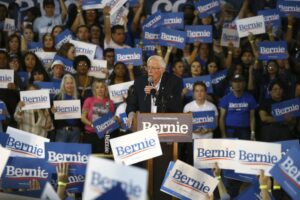
Senator Bernie Sanders suspended his presidential campaign yesterday. (Photo from AP)
Sanders Drops Out of the Presidential Race
Senator Bernie Sanders officially ended his presidential campaign yesterday, paving the way for frontrunner and former Vice President Joe Biden’s path to the Democratic nomination. Sanders performed well in the early contests of Iowa, New Hampshire, and Nevada, but has struggled in most of the primary elections since South Carolina, allowing Biden to gain a substantial lead in the number of total pledged delegates. In a video address announcing his decision, Sanders concluded that he was dropping out of the race because he no longer had a viable path to the nomination. This latest development leaves Biden as the presumptive Democratic nominee to challenge President Trump in the November general election.
U.K. Prime Minister in ICU
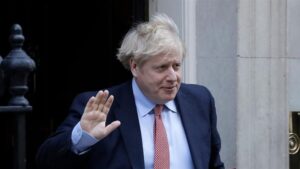
Prime Minister Boris Johnson was moved to the ICU earlier this week after his coronavirus symptoms worsened. (Photo from AP)
U.K. Prime Minister Moved to the ICU for Coronavirus Treatment
U.K. Prime Minister Boris Johnson was moved to an intensive care unit (ICU) earlier this week after his coronavirus symptoms worsened. The Prime Minister was diagnosed with COVID-19 two weeks ago, and was taken to a London hospital last week. In his absence, Johnson appointed Foreign Secretary Dominic Raab to deputize for him. The prime minister remains on oxygen in the ICU, but he is in stable condition, and his office released a statement saying his health was steadily improving. President Trump called Johnson a “very good friend” and said he was saddened to hear he had been moved to the ICU. The president also said he had facilitated a conversation between Johnson’s doctors and leading American medical companies to see if there was any assistance they could provide.
WH Adviser Warned Trump Administration
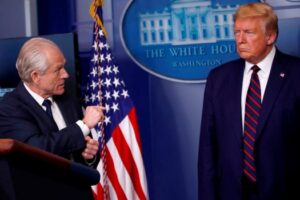
The Trump Administration’s top trade official warned of the potential severity of a coronavirus outbreak in the United States in a January memo to West Wing staff. (Photo from AP)
White House Adviser Warned of the Potential Impact of a Coronavirus Pandemic
A top White House adviser reportedly warned Trump Administration officials in January about the potential severity of the coronavirus outbreak. Peter Navarro, the trade adviser to the president, circulated a memo to West Wing staff in late January that warned the outbreak could cost the United States trillions of dollars. Navarro warned that a combination of no existing cure or vaccine, and no immune protection could elevate the risk of the virus escalating into a pandemic and severely impacting life in the United States. The memo included a “worst case scenario” in which the virus was not aggressively contained and resulted in the deaths of over half a million Americans.
Wisconsin Presidential Primary

Voters in Wisconsin headed to the polls to cast their ballots on Tuesday despite the ongoing coronavirus pandemic. (Photo from AP)
Wisconsin Holds Presidential Primary Despite Ongoing Coronavirus Crisis
The state of Wisconsin moved forward with its originally-scheduled presidential primary election on Tuesday, despite the growing coronavirus outbreak in the United States. In the face of the ongoing health crisis, Governor Tony Evers had issued an executive order to postpone the election until June 9th after the state legislature refused to do so. However, the Wisconsin Supreme Court overruled Evers’ executive order, allowing the primary to carry on as planned. The controversial decision comes at a time when Wisconsin, like the majority of states around the country, is under a statewide stay-at-home order. Wisconsin is the last remaining state scheduled to hold in-person voting this month for the presidential primaries, as all other states have either postponed their elections or moved to an entirely vote-by-mail system. Election results are not expected to be released until early next week.
Acting Navy Secretary Resigns
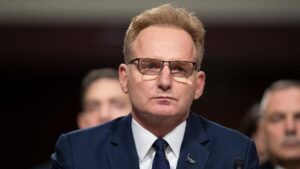
Modly came under fire for his comments regarding the ousted captain of the USS Theodore Roosevelt. (Photo from AP)
Acting Navy Secretary Resigns Following Controversial Remarks
Acting Navy Secretary Thomas Modly resigned earlier this week after leaked audio uncovered his controversial remarks regarding Captain Brett Crozier, the now-ousted commander of the USS Theodore Roosevelt. Crozier sent a memo pleading for help with a coronavirus outbreak on his ship, which leaked to the media and prompted Modly to remove Crozier from his position. In a speech made to crewmembers aboard the USS Roosevelt, Modly controversially said that if Crozier didn’t think his letter would leak, he was “too naive or too stupid to be a commanding officer of a ship like this.” Ironically enough, the audio of Modly’s address was leaked to media outlets as well and resulted in the backlash that subsequently led to his resignation. Following Modly’s resignation, Secretary of Defense Mark Esper tapped James McPherson, undersecretary of the Army, to be the new acting Navy Secretary.
U.S. Government Sends Masks to Israel

The U.S. Department of Defense reportedly shipped a million face masks to Israel, while shortages mount at home. (Photo from Reuters)
U.S. Government Sends Masks to Israel, Despite Domestic Shortages
The U.S. Department of Defense (DOD) reportedly shipped a million face masks to Israel, as shortages mount in the United States. The Department of Defense’s Delegation of Procurement was involved in the shipment of masks to Israel, to be used by soldiers in the Israeli Defense Forces (IDF) on the frontline of the fight against the coronavirus. In the United States, healthcare workers in New York and elsewhere have been complaining of a shortage of masks and other protective gear. Meanwhile, Mossad, Israel’s spy agency, has been scouring the globe trying to procure protective equipment as coronavirus cases mount in Israel. Israel currently has just over 9,700 confirmed cases of COVID-19, while the United States is reporting upward of 435,000.
U.N. Investigation in Syria
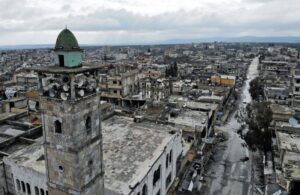
A United Nations inquiry into bombings on humanitarian sites in Syria failed to mention Russia, despite conclusive evidence pointing to its involvement. (Photo from the Kyiv Post)
U.N Investigation into Attacks on Civilian Sites in Syria
The United Nations concluded its investigation into attacks on humanitarian sites in Syria by releasing a “mealy-mouthed” report that alludes to war crimes committed by Russia, but fails to name the country directly. The report blamed the Syrian government and its allies for the majority of attacks on humanitarian sites such as schools and hospitals, but didn’t name Russia specifically, despite Russia’s military support for the Syrian government. The United Nations’ board of inquiry that investigated the attacks focused on six specific bombings out of hundreds that had occurred. A summary of the board’s findings didn’t directly blame Russia, despite conclusive evidence pointing to a Russian plane carrying out the bombing of a school in one of the six attacks being focused on. The board of inquiry began its work in August after being appointed by U.N. Secretary General Antonio Guterres. Human rights and advocacy organizations had previously criticized the board for the limited scope of its investigation.
